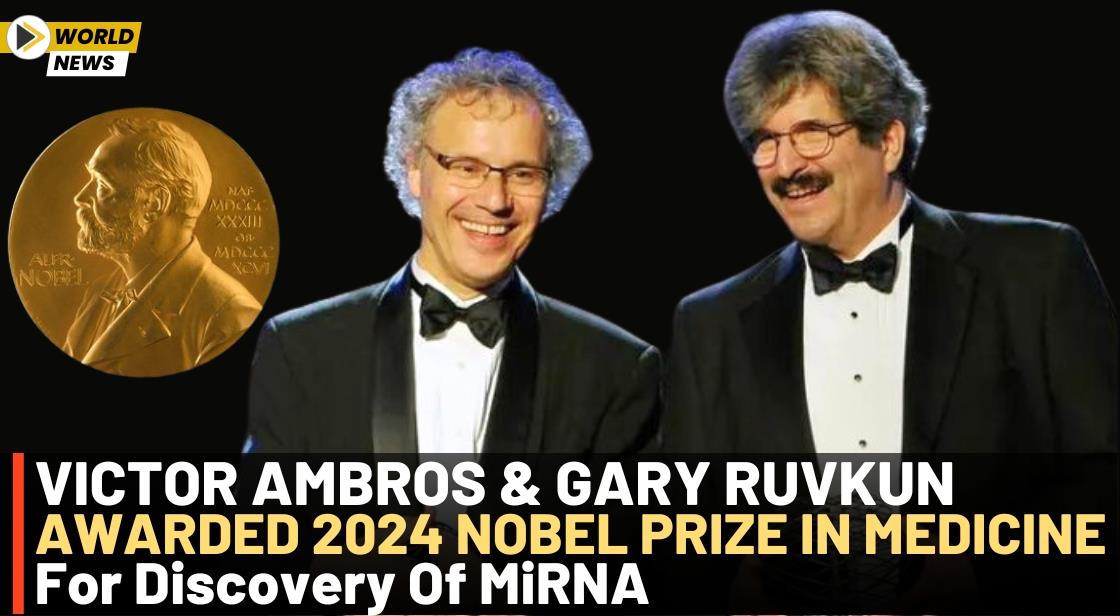Victor Ambros and Gary Ruvkun Awarded 2024 Nobel Prize in Medicine for Discovery of miRNA

News Synopsis
The Nobel Prize in Physiology or Medicine for 2024 has been awarded to Victor Ambros and Gary Ruvkun for their groundbreaking discovery of microRNA (miRNA) and its critical role in gene regulation at the post-transcriptional level. This monumental discovery has significantly contributed to our understanding of how genes are regulated in multicellular organisms, including humans.
Gene Regulation: A Crucial Process
Genetic information in our chromosomes acts as an instruction manual for all cells in the body. Despite each cell containing the same set of genes, different cell types, such as muscle and nerve cells, exhibit unique characteristics. This diversity is a result of gene regulation—a biological process through which cells activate only the genes they require for their specific functions.
The Discovery of microRNAs
Victor Ambros and Gary Ruvkun, both renowned for their curiosity about cellular differentiation, sought to understand how various cell types develop and maintain their unique properties. Their research led to the discovery of microRNAs—tiny RNA molecules that regulate gene expression by binding to messenger RNA (mRNA) and controlling its translation into proteins. This discovery introduced a new dimension to gene regulation, revealing a crucial mechanism that is essential for normal development and function in multicellular organisms.
MicroRNAs play a significant role in post-transcriptional regulation by preventing the translation of specific mRNAs into proteins. This regulation ensures that cells produce only the necessary proteins, maintaining cellular balance and function.
Importance of MicroRNAs in Human Biology
The discovery of microRNAs has had a profound impact on our understanding of genetics and biology. The human genome contains over a thousand microRNAs, which play a vital role in various biological processes, including development, cell differentiation, and immune responses. MicroRNAs have been shown to regulate critical functions in the body, and their dysregulation has been linked to numerous diseases, including cancer, cardiovascular disorders, and neurological conditions.
According to the Nobel Prize announcement, the recognition of Ambros and Ruvkun's work highlights "a vital regulatory mechanism used in cells to control gene activity." Genetic information typically flows from DNA to messenger RNA (mRNA) through transcription and is then used by the cellular machinery to synthesize proteins. MicroRNAs act as key regulators in this flow of genetic information by influencing the stability and translation of mRNAs, thus controlling gene expression.
Victor Ambros: A Pioneer in RNA Research
Victor Ambros, born in 1953 in Hanover, New Hampshire, USA, has had a remarkable career in the field of RNA research. He earned his Ph.D. from the Massachusetts Institute of Technology (MIT) in 1979, followed by postdoctoral research at MIT until 1985. In 1985, he joined Harvard University as a Principal Investigator. Ambros later served as a professor at Dartmouth Medical School from 1992 to 2007, and he currently holds the position of Silverman Professor of Natural Science at the University of Massachusetts Medical School in Worcester, Massachusetts.
Ambros’ pioneering work in the discovery of microRNAs has laid the foundation for a new field of genetic research, providing insights into the intricate mechanisms of gene regulation and their implications for health and disease.
Gary Ruvkun: Contributions to Genetic Research
Gary Ruvkun, born in 1952 in Berkeley, California, USA, has also made significant contributions to the field of genetics. He earned his Ph.D. from Harvard University in 1982 and conducted postdoctoral research at MIT from 1982 to 1985. In the same year, he became a Principal Investigator at Massachusetts General Hospital and Harvard Medical School, where he now serves as a Professor of Genetics.
Ruvkun's work, alongside Ambros, has revolutionized our understanding of gene regulation, particularly through their research on microRNAs. Their discovery has far-reaching implications for how we view cellular function, disease development, and potential therapeutic approaches.
The Nobel Prize: Recognizing Excellence in Medicine
The Nobel Prize in Physiology or Medicine is awarded annually by the Nobel Assembly, a group of 50 distinguished professors from the Karolinska Institutet in Sweden. The prize is given to individuals or teams who have made exceptional contributions to medical science that benefit humankind. Since its inception in 1901, the Nobel Prize has honored groundbreaking discoveries that have advanced human knowledge and improved health outcomes globally.
The 2024 Nobel Prize marks another significant milestone in the history of medical science, following the 2023 award that recognized Katalin Kariko and Drew Weissman for their pivotal work on nucleoside base modifications, which facilitated the development of effective mRNA vaccines against COVID-19.
Legacy of Alfred Nobel and the Nobel Prize
The Nobel Prize was established according to the will of Alfred Nobel, the Swedish inventor and industrialist who invented dynamite. Nobel, who held a strong interest in scientific advancements, wanted his fortune to be used to recognize individuals who made the greatest contributions to humanity. In his will, he stipulated that the Nobel Prizes should be awarded annually in the fields of Physics, Chemistry, Physiology or Medicine, Literature, and Peace.
The Nobel Prize ceremonies, held every October in Stockholm and Oslo, are highly anticipated events that celebrate scientific achievements and global contributions. The selection of laureates each year represents the pinnacle of recognition in their respective fields, serving as a beacon of progress in the pursuit of knowledge.
Conclusion: A Revolutionary Discovery
Victor Ambros and Gary Ruvkun’s discovery of microRNA has forever changed the landscape of genetic research, offering new insights into gene regulation and its role in development and disease. Their Nobel Prize in Medicine for 2024 is a well-deserved recognition of their pioneering work, which continues to influence research and therapeutic approaches around the world. The impact of microRNA on gene regulation has opened up new possibilities for understanding and treating complex diseases, making it one of the most significant discoveries in modern biology.









